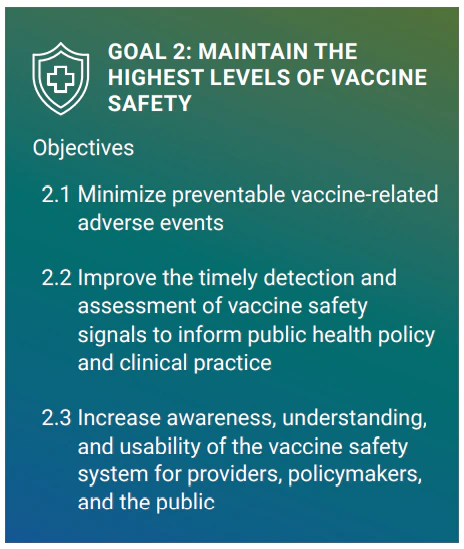To ensure the ongoing success of vaccines, it's critical to continuously assess and strengthen vaccine safety efforts. We work with federal partners and non-federal stakeholders to support vaccine safety systems, surveillance, monitoring, and research.
Vaccine Safety in the United Sates: Background
- The second goal of the Vaccine Plan is to maintain the highest levels of vaccine safety and effectively communicate the strengths of the U.S. vaccine safety system to providers, policymakers, and the public.
To help meet this goal, the Vaccine Plan provides several objectives.

Federal Efforts to Ensure Continued Support of Vaccine Safety
We support vaccine safety in a number of ways. For example, we:
- Offer funding opportunities
- Commission research and reviews of safety topics
- Coordinate the Vaccine Safety Scientific Agenda
- Lead the Immunization Safety Task Force
- Assist federal agencies with research efforts
- Work with international organizations to support vaccine safety around the world
Vaccine Safety Research
In May 2021, the Agency for Healthcare Research and Quality (AHRQ) published an update, funded by the Office of Infectious Disease and HIV/AIDS Policy, to a 2014 report that systematically reviewed evidence to assess the safety of vaccines in the immunization schedule recommended for children, adolescents, adults, and pregnant people. These reports built on the 2011 Institute of Medicine (IOM) consensus report Adverse Effects of Vaccines: Evidence and Causality. The May 2021 report finds no new evidence of increased risk for key adverse events following administration of vaccines that are routinely recommended for adults, children, and pregnant women. Safety signals from the prior report remain unchanged for adverse events that include anaphylaxis in adults and children, and febrile seizures and idiopathic thrombocytopenic purpura in children. There continues to be no evidence of increased risk of adverse events for vaccines currently recommended in pregnant women.
Vaccine Safety Scientific Agenda
The Vaccine Safety Scientific Agenda outlines the efforts of federal agencies on vaccine safety—and the scientific activities and interagency coordination that contribute to the safety system.
Resources on Vaccine Safety
To learn more about vaccine safety in the United States, check out these National Vaccine Program-supported publications:
- Kaiser Permanente Northern California Pregnancy Database: Description and Proof of Concept Study
- Safety of Vaccines Used for Routine Immunization in the United States: An Update
- Unique Safety Issues Associated with Virus-vectored Vaccines: Potential for and Theoretical Consequences of Recombination with Wild Type Virus Strains
You can also find more information in the following resources:


